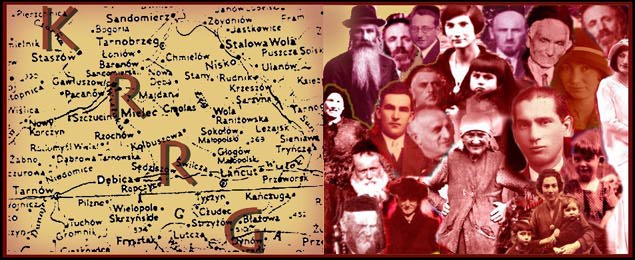


In 1939 the Jewish
population of
Rozwadów
numbered more than 2,000.
On September 24, 1939, the town was captured by the Germans, and on October 2, they ordered it to be evacuated within 24 hours. The Jews were deported across the San River into the Soviet held portion of Poland. In the summer of 1940 many were exiled to the Soviet interior.
Later, Jews were
permitted to return to Rozwadów and by September 1940, some 400 Jews lived there
legally, and a Judenrat *** formed. The first head of the
Judenrat was
Eliezer Perlman, the second was B. Garfinkel.
The final expulsion
of Jews took place on July 21, 1942, with all the Jews being sent to Debica from
where they were dispersed to various locations. Later, a labour camp was
established in the town, and Jews were brought in as workers. It is estimated
that about 1,000 Jews died in the camp.
Rozwadów was captured by the Germans on September 24, 1939. On October 2 the Jews of Rozwadów were deported across the San River into the part of Poland held by the
Russians. Some time
later they were allowed to return. By September 1940 there were approximately
400 Jews living in Rozwadów legally and they formed a Judenrat ***
On July 21, 1942 the final expulsion of the Jews of Rozwadów took place. They were sent to Debica and from there transported to various locations. Later a Labour Camp was established in Rozwadów and Jews were brought in as workers. An estimated 1.000 Jews died in the camp.
The final expulsion took place on July 21, 1942. All the Jews in Rozwadów were assembled in the market square. Many were killed on the spot, others were placed into railroad cars and taken to Debica, where Jews from the entire vicinity were concentrated. Some were killed in a nearby forest; others were deported to camps at Tarnobrzeg, Pustków, Rzeszów, Mielec, Stalowa Wola, and other localities. A labor camp was established in Rozwadów. On Sept. 1, 1942, 80 Jews were brought there from Sieniawa, Lezajsk, and the vicinity. As the rate of expulsion of Jews from the vicinity grew, 600 male Jews, mostly from Wieliczka, were brought to the camp. On Sept. 15, 1942, 450 Jews from Wolbrom arrived. Late in 1942 there were more than 1,200 prisoners, including Jews from Przemysl and Rzeszow. The prisoners worked in the steel factories of Stalowa Wola. Working conditions were hard, and anyone who could not withstand the physical strain was shot. More than 1,000 Jews died in the camp.
*** The German authorities required each community to form a Jewish Council (Judenrat). The Jewish Council was usually composed of former community leaders. These councils acted as intermediaries to carry out the German’s increasingly oppressive demands such as providing forced labor battalions for German war factories, and eventually even delivering Jews directly to the trains bound for the death camps.
SLB
© Copyright 2017 Kolbuszowa Region Research Group. All rights reserved.